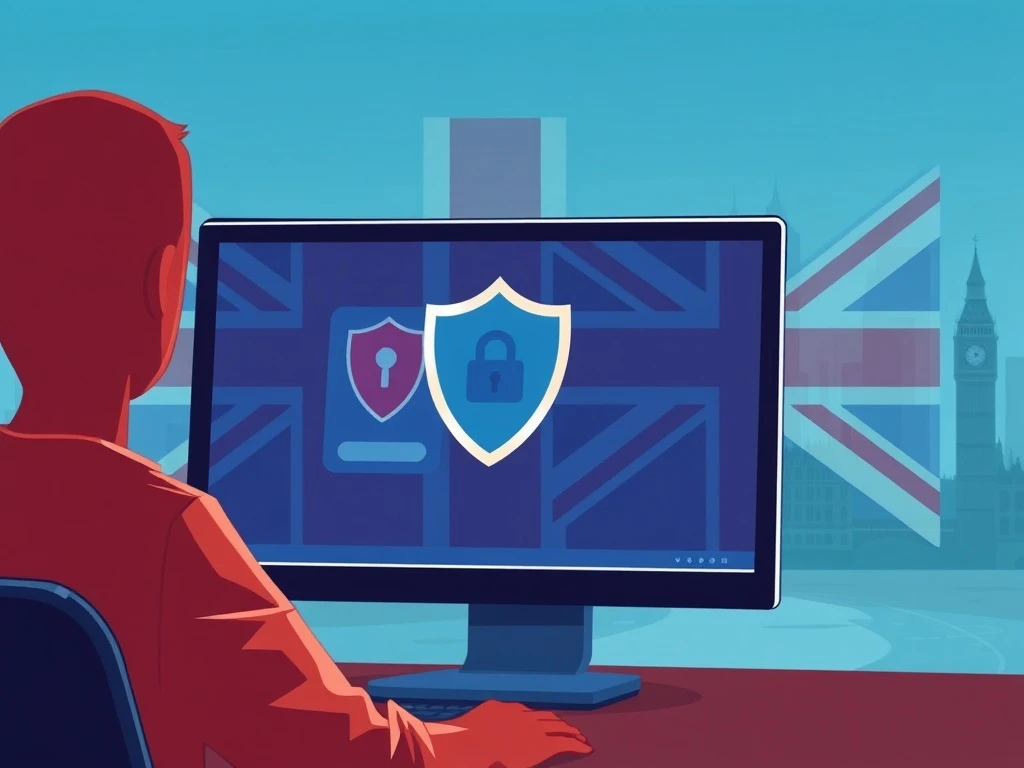Proton VPN: Unprecedented 1400% Surge in UK as Online Safety Act Sparks Privacy Uproar

In the ever-evolving landscape of digital governance, a recent event in the United Kingdom has sent ripples across the internet, highlighting the growing tension between regulatory oversight and individual online freedom. Specifically, the implementation of the UK’s Online Safety Act has led to an unprecedented surge in demand for Virtual Private Networks (VPNs), with Proton VPN reporting a staggering 1400% increase in UK sign-ups. This dramatic rise underscores a powerful user response to new age verification requirements, signaling a significant shift in how British internet users are navigating their online world.
The Online Safety Act: What Sparked the UK VPN Surge?
The catalyst for this sudden shift is the United Kingdom’s Online Safety Act, a landmark piece of legislation designed to make the internet a safer place, particularly for children. Enacted in early July 2025, the law introduced stringent age verification requirements for platforms hosting adult content, including social media and dating apps. The goal is clear: to prevent underage exposure to explicit material and harmful content online.
However, the methods prescribed for age verification—such as government-issued ID checks or credit card information—have raised significant concerns among the public. Many users view these measures as intrusive, burdensome, and a potential threat to their personal data privacy. This perception directly fueled the UK VPN usage surge. People quickly sought tools to bypass these new restrictions, leading to an immediate spike in VPN downloads and sign-ups.
- Mandatory Age Verification: Platforms must now verify users’ ages for adult content access.
- Privacy Concerns: Users worry about sharing sensitive personal data for verification.
- Bypass Efforts: VPNs offer a way to mask location and circumvent regional or platform-specific restrictions.
Navigating Digital Boundaries: Why Users Seek Online Privacy
The rapid adoption of VPNs, particularly services like Proton VPN and NordVPN (both hitting the UK App Store’s top 10 free apps), isn’t just about avoiding age checks. It reflects a broader, deeper concern among internet users regarding their online privacy and digital autonomy. Many feel that the government’s attempts to regulate online spaces, while well-intentioned, can inadvertently lead to overreach and stifle individual freedoms.
Users are increasingly prioritizing their ability to control their online footprint, access content without unnecessary hurdles, and protect their data from surveillance—whether by governments or corporations. The surge in VPN use illustrates a collective act of resistance, a statement that users are willing to actively seek out solutions to maintain their perceived online liberties. This trend aligns with global discussions about data sovereignty and the right to privacy in an increasingly interconnected world.
Age Verification UK: A Silver Bullet or a Digital Dilemma?
While the UK government’s intention behind the age verification UK measures is commendable—to protect minors—the effectiveness of the law is being widely debated. Critics argue that mandating identity checks might not truly deter underage access if users can easily bypass the system. The proliferation of VPNs and other unregulated alternatives, including offshore services or unsecured proxies, suggests that the law might inadvertently push users towards less secure or less transparent methods of accessing content.
The debate extends beyond user behavior to the political arena. Over 290,000 signatures on a petition calling for the law’s repeal demonstrate significant public dissatisfaction, exceeding the threshold for parliamentary debate. Furthermore, the law has drawn diplomatic concerns from US officials, particularly within the Republican-aligned bloc, who worry about its implications for digital sovereignty and free speech. Regulator Ofcom acknowledged that age checks are “not a silver bullet,” highlighting the complex challenge of enforcing digital restrictions in a globalized internet.
Beyond Proton VPN: Broader Implications for Internet Freedom
The story of Proton VPN‘s explosive growth in the UK is more than just a headline; it’s a test case with global implications. Other democracies are closely monitoring the outcomes of the UK’s Online Safety Act, as they too grapple with balancing online safety with civil liberties. The rapid proliferation of VPN usage underscores a fundamental tension: how do governments protect vulnerable populations online without infringing on the privacy and freedom of expression of adult users?
This situation highlights several key takeaways:
- User Ingenuity: Internet users will often find ways to circumvent restrictions they perceive as unjust or overly intrusive.
- Global Reach of the Internet: National regulations face significant challenges when applied to a borderless digital ecosystem.
- Privacy as a Priority: For many, online privacy is a non-negotiable right, driving demand for privacy-enhancing technologies.
The UK’s experience serves as a crucial lesson in digital policy-making. While the intent to create a safer online environment is noble, the unintended consequences—like a massive surge in VPN adoption—demonstrate the complexities of regulating an interconnected world. The ongoing debate emphasizes the need for a nuanced approach that considers both protection and fundamental rights.
The dramatic increase in VPN sign-ups in the UK following the Online Safety Act’s implementation is a powerful indicator of user sentiment. It showcases a strong desire for online privacy and autonomy, even in the face of stricter regulations. As governments worldwide continue to explore ways to manage the digital realm, the UK’s experience with its controversial age verification measures and the public’s swift embrace of tools like Proton VPN will undoubtedly inform future policy discussions. It’s a clear signal that the balance between safety and freedom online remains a delicate, ongoing negotiation.
Frequently Asked Questions (FAQs)
What is the UK Online Safety Act?
The UK Online Safety Act is a new law implemented in July 2025, designed to make the internet safer, particularly for children. It mandates that online platforms hosting adult content implement age verification measures to prevent minors from accessing explicit or harmful material.
Why did VPN sign-ups surge in the UK after the Act?
VPN sign-ups, notably for Proton VPN, surged by 1400% because many users sought to bypass the new age verification requirements. Users perceive these requirements as intrusive to their privacy and prefer to use VPNs to mask their location and circumvent the restrictions.
How does age verification work under the Act?
The Act requires platforms to verify users’ ages through methods such as government-issued ID checks or credit card information before allowing access to adult content. This aims to ensure that only adults can view certain types of material.
What are the criticisms of the Online Safety Act?
Critics argue that the Act’s age verification methods are intrusive, pose privacy risks, and may not effectively deter underage access as users can easily bypass them with tools like VPNs. There are also concerns about digital sovereignty and free speech implications, drawing political and diplomatic backlash.
Are VPNs legal in the UK?
Yes, VPNs are legal to use in the UK. While the Online Safety Act aims to regulate content access, using a VPN to enhance privacy or bypass geo-restrictions for legal content is not against the law.
What does this mean for online privacy globally?
The UK’s experience serves as a test case, highlighting the global tension between online safety regulations and individual privacy rights. The surge in VPN usage demonstrates that users prioritize privacy and will seek tools to maintain it, influencing how other countries might approach similar legislation in the future.









